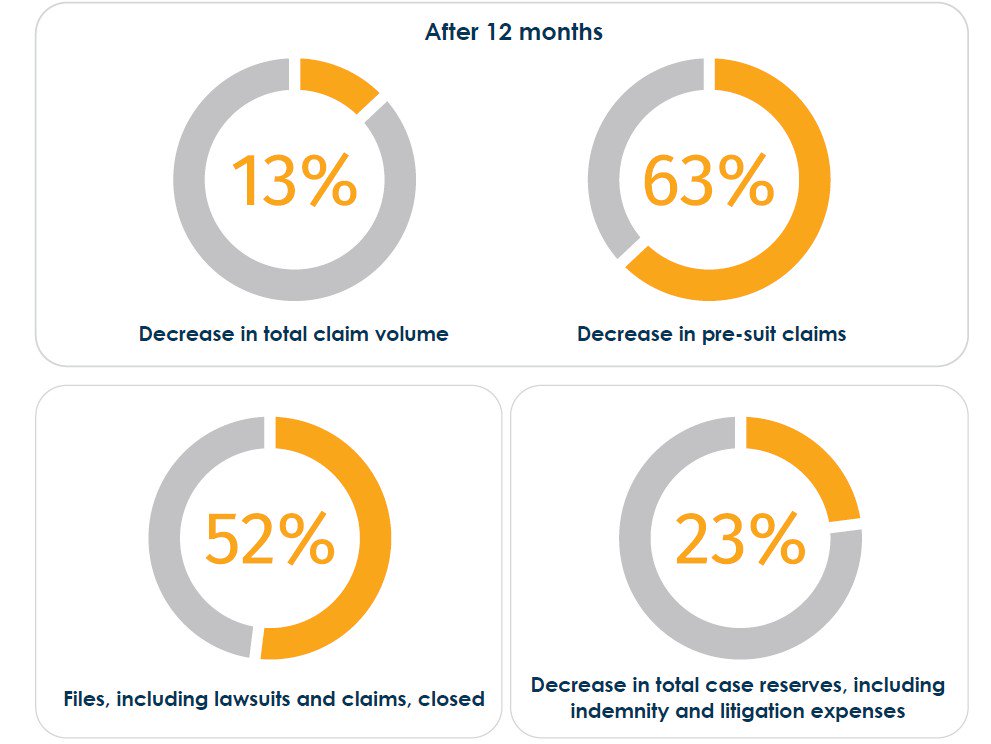By: Bill Bower

March 11, 2023 — Patients count on leadership within hospitals to support their evolving healthcare needs while managing the complex risks of running a successful healthcare business. Whether confronted with a healthcare professional medical malpractice or general liability issue, the process you follow and the expertise you leverage to manage a complex issue can differentiate between a significant loss and a successful resolution.
Breaking Down Complexity
The word "complex" is defined as "a whole made up of complicated or interrelated parts." Complexity can be daunting. When faced with a complex issue or problem, our first reaction is often hesitation or resistance. The issue is too intricate, the problem too vast for us to embrace. We find ourselves establishing barriers — it's too complex, too time-consuming to engage, or other, simpler tasks need to be conquered. These barriers, in turn, can lead us to avoidance. Or we attempt to solve the complex with an equally complicated solution. Such solutions percolate, are analyzed, and become far too daunting to tackle.
In my role as a Healthcare leader at Gallagher Bassett (GB) Specialty, complexity is part of our everyday work: complex facts, complex damages, complex medicine, and more. Throughout my career, I have discovered three key components to successfully managing a complex issue that I believe can help hospitals and healthcare organizations consistently achieve superior outcomes:
1. Embrace the Uncomfortable
Complexity can be paralyzing. In fact, studies have shown that humans tend to gravitate toward the simple. Our natural instinct is to avoid overstress, conserve energy, and minimize difficult undertakings for survival's sake. This inherent, natural response to complexity or when facing the complex issue is to immediately seek out reasons why it can't be solved or managed. In a word, complexity is uncomfortable. Acknowledging discomfort is the first step toward building a plan, managing expectations, and achieving a resolution.
2. Simplify the Problem and the Solution
Often, we decide that every complex problem must require a complex solution. And at the outset, even the thought of trying to simplify the complex may seem overwhelming. Further, the more complex the plan, the more difficult it is to execute. This is when taking the complex and breaking it down into more manageable parts is key. Don't just break down the plan; break down the solutions into segments to achieve meaningful milestones along the way to resolution. When we do the work to simplify, which is where we feel more comfortable, the complex issue becomes more palatable and will allow us to move toward execution.
3. Identify the Goal and Understand Your Audience
At the outset of trying to solve a complex issue, understanding your audience is essential in defining your goal or measure of success. Ask yourself, "What are we managing, and to whom are we messaging?" These answers will help guide you through simplifying the complex and reaching your goal, one solution at a time.
Great vision without execution is hallucination.
The Secret to Successful Execution
When it comes to solving the complex issue in healthcare, the reality is that while having an incredible vision and sound strategy are valuable, there can be no change — no progress or eventual resolution — without execution. Indeed, as Thomas Edison once said, "Great vision without execution is hallucination." No successful vision or plan can succeed without execution.
But even if we've been able to tackle the complex and break down the solution into manageable parts, we often pause and ask the question, particularly when the outcome is uncertain, "What if I fail?" This question, and the responses it brings, can be paralyzing. The questions draws negative responses. These negative responses can serve as the foundation to barriers and keep us from moving forward. So instead of asking the question, "What if I fail?" I suggest reframing the inquiry to "What will I do if I fail?"
There is a significant difference between asking, "What if I fail?" and "What will I do if I fail?"
We all fail. "What if I fail?" invites negative responses. Negative responses serve as the foundation for barriers. "What will I do if I fail?" is a question that seeks solutions and, in my experience, can empower you to move forward and take action.
Here is a case study example of a healthcare system that was struggling financially with self-administering their professional and general liability risk and how the three steps to simplifying a complex issue lead to a successful outcome.
Case Study
Challenge
A healthcare system was struggling with how to self-administer its professional and general liability risk and claims management functions in the face of exponential growth. The client wanted to maintain control and not fully outsource its claims management program. There were a number of moving parts and complexities at play.
The client appreciated that collaborating with GB Healthcare allowed it to secure national expertise in healthcare claims management, which is historically complex, while limiting the need to add additional internal resources.
Three Steps:
1. Embrace the Uncomfortable
GB Healthcare conducted a reserve analysis audit to understand the system's current exposures and why the healthcare system was struggling. The problems were complex and, therefore, uncomfortable to face. There was also discomfort surrounding the message of our findings to the client: their organization was failing — and no one likes to hear about their failures. But embracing the uncomfortable and moving forward is essential. Our job is to tell our clients what they need to know, not what they may want to hear.
2. Simplify the Strategy
We first worked with the client to define its approach to litigation and then helped implement that litigation approach across the open claim inventory. Armed with a shared sense of direction, our team began a comprehensive factual review of each open matter, evaluating the facts, claimed damages, strengths, and weaknesses. We found that the initial investigations were incomplete, and the reporting was inconsistent in many cases. Therefore, we partnered with the client to:
- Develop and distribute litigation guidelines to counsel
- Create a standardized approach to case reporting
- Develop a report card for tracking compliance by defense counsel to the new guidelines.
3. Understanding Your Audience
Knowing the client's goal of continuing self-administration, we knew we must create tools for their staff to use once our engagement was complete. Using lessons learned from the closed matters, we implemented a risk mitigation tool for the client's front-line staff to use going forward.
Solution:

After 12 months, the program had a 13% decrease in total claim volume and a remarkable 63% decrease in pre-suit claims.
A total of 52% of files, including lawsuits and claims, were closed.
The program also had a 23% decrease in total case reserves, including indemnity and litigation expenses.
The decrease in the client's claim volume and total reserves was directly related to the collaborative and proactive strategy of its newly implemented claims management practices. Prospectively, the client's claims management program has tools in place to effectively and efficiently manage professional and general liability claims with the flexibility to mature and expand with operational growth.
When confronted with a complex issue, the initial reaction might be discomfort, but partnering with experts who have experience successfully breaking down and resolving complex issues can help you build confidence that will positively impact you now and in the future. GB Healthcare leverages the deep expertise of our professional staff, which includes former defense attorneys, insurance claims executives, registered nurses, and certified healthcare risk managers, to comprehensively support achieving superior outcomes for our clients.
Author
Make Gallagher Bassett your dependable partner
When making the right decision at the right time is critical to minimize risk for your business, count on Gallagher Bassett's extensive experience and global network to deliver.


